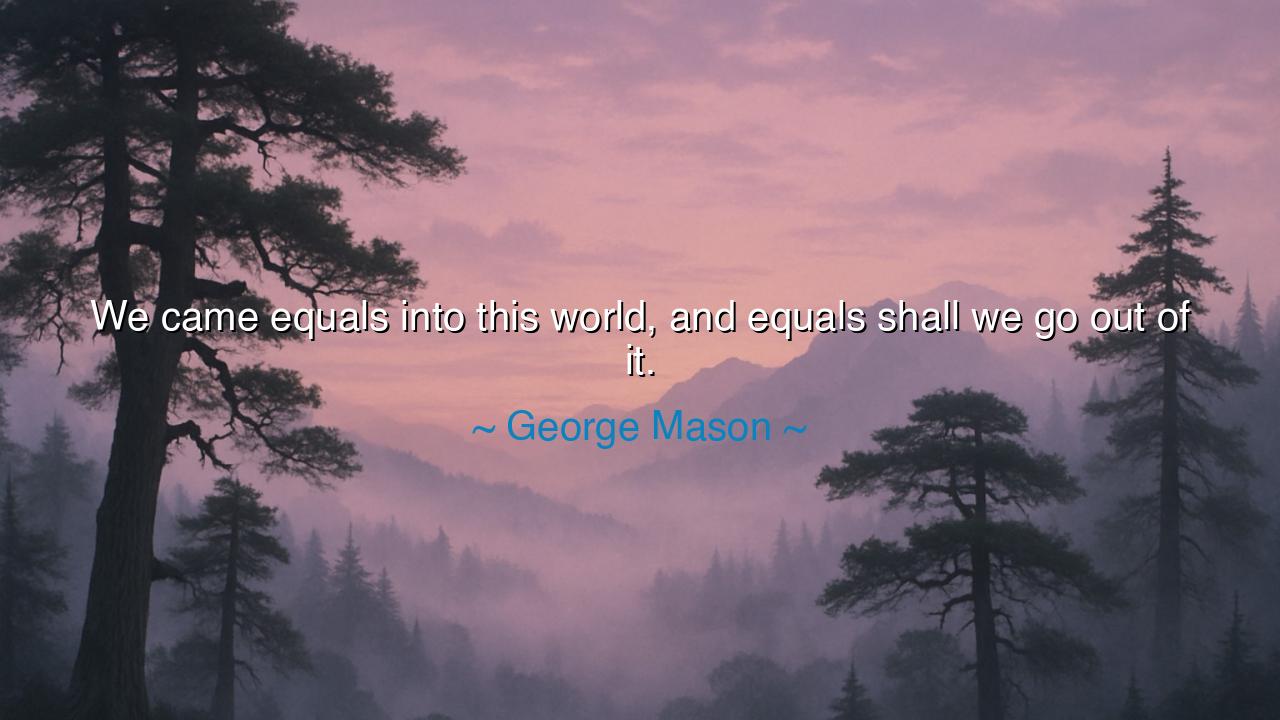
We came equals into this world, and equals shall we go out of it.






The words of George Mason—“We came equals into this world, and equals shall we go out of it.”—resound like the tolling of a great bell across the ages, a solemn reminder of the eternal balance woven into the fabric of life. In this simple yet profound truth, Mason speaks to the heart of human dignity, to the divine symmetry of birth and death that binds all mortals beneath the same sky. We are born not as kings or beggars, not as masters or slaves, but as equals, each carrying within the breath of life that knows no rank. And when death calls us home, it strips away all titles, leaving behind only the measure of our deeds and the purity of our hearts.
The origin of this quote lies in the turbulent dawn of a new nation. George Mason, one of the great architects of liberty in the eighteenth century, was a Virginian patriot whose mind and conscience helped shape the Declaration of Rights—a precursor to the Bill of Rights in the United States Constitution. He stood among men of power and intellect, yet he spoke with the humility of one who knew that all such distinctions fade before eternity. When he declared that “we came equals into this world,” he was not merely uttering philosophy, but declaring a creed: that freedom and justice must rest upon the truth of human equality, not the false hierarchies of birth, wealth, or power.
Mason’s words were born in an age when nations still bowed to kings and empires divided humanity into classes. Yet he saw beyond the illusions of privilege and understood that Nature herself recognizes no nobility but virtue. The child of a laborer enters life with the same breath as the child of a lord; the grave receives both without distinction. In those brief years between cradle and coffin, society may cloak men in robes of authority or chains of oppression, but the soul—the eternal essence—remains untouched. Thus, Mason’s declaration is not only political but spiritual, reminding all who hear it that equality is not granted by law or crown, but by creation itself.
To see this truth reflected in history, we might look to the life of Abraham Lincoln, who rose from humble beginnings in a log cabin to become one of the greatest leaders of his age. In his heart burned the same conviction that guided Mason: that all men are created equal. Lincoln’s struggle to end slavery was not merely a fight for policy, but a fulfillment of Mason’s vision—that no man should be raised above another by birth, color, or circumstance. And when Lincoln’s life was taken, he was laid in the earth like any other man. No monument, no crown, could alter the simple reality that death restores equality, returning every soul to the same dust from which it came.
Mason’s insight is both humbling and liberating. It strips away the arrogance of the powerful and the despair of the poor. It teaches that while the world may honor wealth, titles, and fame, true worth lies in the moral substance of the soul. The tyrant and the servant alike must one day stand before the same judgment of time, and there, only virtue will speak. This truth, when remembered, becomes a guiding star for the living: to act justly, to treat others not by station but by humanity, to remember that every person you meet walks the same fragile path between birth and death.
Yet Mason’s words also carry a challenge. If we are born equals and die equals, how can we tolerate inequality among the living? He calls upon us to see in every face the reflection of our own. The poor man’s hunger, the oppressed woman’s silence, the stranger’s suffering—these are not distant sorrows, but the shared burdens of our common nature. The wise will recognize that justice is not charity, but recognition of kinship. To honor equality is not merely to proclaim it, but to live it: to lend our strength where others falter, to speak for those denied a voice, and to act with compassion, knowing that all distinctions will one day fall away.
So, my child, remember this truth as an anchor for your soul: all that divides us is temporary; all that unites us is eternal. Walk humbly, for your crown is made of dust; walk nobly, for your spirit is made of light. Do not measure men by their riches or poverty, but by their courage, their kindness, and their truth. Live so that when you depart this world, you do not leave it burdened with more chains, but blessed with more freedom. For when we stand again as equals at the gates of eternity, it will not matter how high we climbed, but how deeply we loved.
Thus, George Mason’s words endure not as a relic of history, but as a law of the human heart. They remind us that equality is not an invention of politics, but a rhythm of life itself—a circle that begins and ends the same for all. Cherish this knowledge, and let it shape your deeds. For when you treat others as equals, you honor not only them, but the divine order of existence, the truth that binds all souls in the great and sacred harmony of being.






AAdministratorAdministrator
Welcome, honored guests. Please leave a comment, we will respond soon